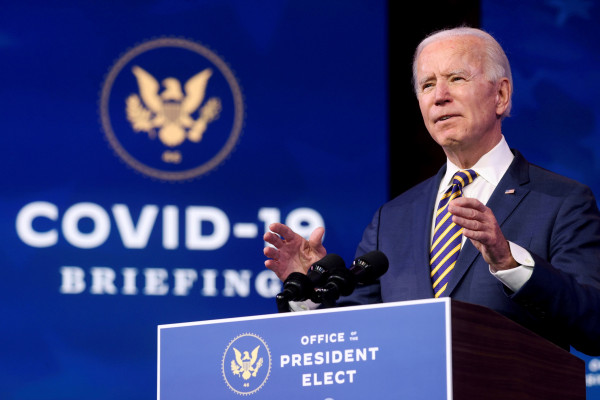Biden's $1.9 trillion COVID-19 relief plan passes hurdle in U.S. House

WASHINGTON (Reuters) - The U.S. House of Representatives moved toward a late-night vote on President Joe Biden's $1.9 trillion coronavirus aid bill on Friday as Democrats who control the chamber steered the sweeping measure toward approval.
The House Rules Committee turned back scores of Republican attempts to modify the package and sent it to the House floor for passage late Friday or early Saturday.
With Republicans lining up in opposition, Democrats who hold a 221-211 majority have few votes to spare.
Democrats said the package was needed to fight a pandemic that has killed more than 500,000 Americans and thrown millions out of work, while Republicans criticized it as too expensive.
The measure would pay for vaccines and medical supplies and send a new round of emergency financial aid to households, small businesses and state and local governments.
Democrats aim to get the bill for Biden to sign into law before mid-March, when enhanced unemployment benefits and some other types of aid are due to expire.
But their path has been complicated by the Senate's rules expert, who said on Thursday that they cannot include an increase in the minimum wage to $15 per hour in the package.
House Speaker Nancy Pelosi predicted the bill will pass Congress with or without the increase, but said Democrats would not give up on the matter.
"We will not stop until we very soon pass the $15 minimum wage," she said at a news conference.
Republicans who have broadly backed previous COVID-19 spending say another $1.9 trillion is simply too much. The White House and some economists say a big package is needed to revive the world's largest economy.
Opinion polls have found broad public support for the package.
"The only place this is a partisan issue is here in Washington," said Democratic Representative Jim McGovern in debate in the House Rules Committee. "We are here because people are hurting and communities are struggling."
Republican Representative Tom Cole said bill was "bloated" with Democratic pet projects unrelated to the coronavirus.
"Shouldn’t we at least spend down the funds already allocated, and see if new money is actually required?" Cole said.
Roughly $1 billion of the $4.1 trillion in coronavirus aid approved last year has yet to be spent, according to the Committee for a Responsible Federal Budget, a nonpartisan watchdog group.
Biden has focused his first weeks in office on tackling the greatest public health crisis in a century, which has upended most aspects of American life.
Pelosi is counting on nearly all of her rank and file to get the bill passed before sending it to a 50-50 Senate where Democratic Vice President Kamala Harris holds the tie-breaking vote.
MINIMUM WAGE HIKE
The House bill would raise the national hourly minimum wage for the first time since 2009, to $15 from $7.25. The increase is a top priority for progressive Democrats.
That is unlikely to win approval in the Senate.
The chamber's parliamentarian ruled on Thursday that, unlike other elements of the sweeping bill, it could not be passed with just a simple majority of 50 senators plus Harris, rather than the 60 needed to advance most legislation in the 100-seat chamber.
At least two Senate Democrats oppose the $15 hourly figure, along with most Republicans. Some are floating a smaller increase, in the range of $10 to $12 per hour.
Senate Majority Leader Chuck Schumer might add a provision that would penalize large corporations that do not pay their workers a $15 minimum wage, a Senate Democratic aide said.
Among the big-ticket items in the bill are $1,400 direct payments to individuals, a $400-per-week federal unemployment benefit through Aug. 29, and help for those having difficulties paying their rent and home mortgages during the pandemic.
An array of business interests also have weighed in behind Biden's "America Rescue Plan" Act, as the bill is called.
Efforts to craft a bipartisan coronavirus aid bill fizzled early on, shortly after Biden was sworn in as president on Jan. 20, following a series of bipartisan bills enacted in 2020.
(Reporting by Richard Cowan and David Morgan; Additional reporting by Susan Cornwell, Andy Sullivan and Eric Beech; Writing by John Whitesides and Andy Sullivan; Editing by Scott Malone, Peter Cooney, Jonathan Oatis, Daniel Wallis and Sonya Hepinstall)












